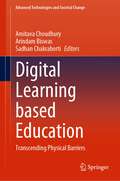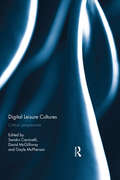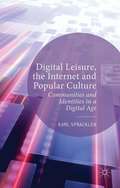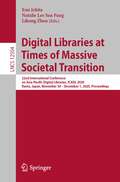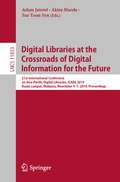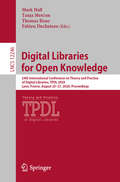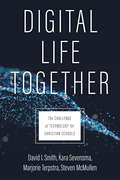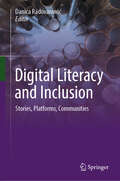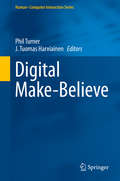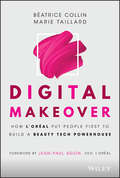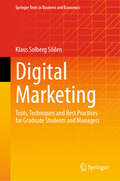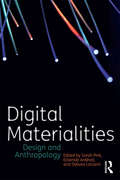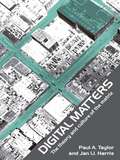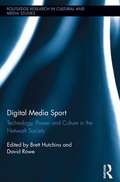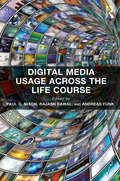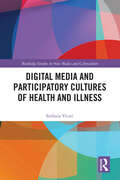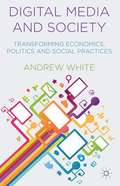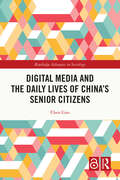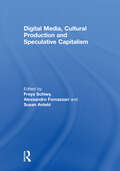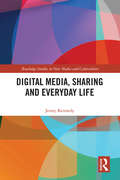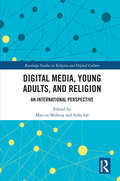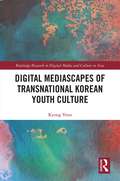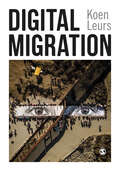- Table View
- List View
Digital Learning based Education: Transcending Physical Barriers (Advanced Technologies and Societal Change)
by Arindam Biswas Amitava Choudhury Sadhan ChakrabortiThis book presents the systematic evolution of digitized education: trends, advances, challenges encountered and their solutions toward the use of advanced technologies. The book mainly covers variety of areas such as blended learning in modern education, flipped classroom, ICT-based education, digital transformation of education. Explosion of information and communication technologies has transformed the way we live, learn, work and socialize. This heavy intervention of technologies in the modern world has triggered us to think how we engage and interact with each other and how we make use of these digital tools and communications channels. And consequent upon which societies are transforming into digitized education where datafication, platformization and algorithmic governance are a common vocabulary.
Digital Leisure Cultures: Critical perspectives
by David McGillivray Gayle McPherson Sandro CarnicelliThe digital turn in leisure has opened up a vast array of new opportunities to play, learn, participate and be entertained – opportunities that have transformed what we recognise as leisure. This edited collection provides a significant contribution to our changing understanding of digital leisure cultures, reflecting on the socio-historical context within which the digital age emerged, while engaging with new debates about the evolving and controversial role of digital platforms in contemporary leisure cultures. This book also demonstrates the interdisciplinary nature of studying digital leisure cultures. To make sense of how individuals and institutions use digital spaces it is necessary to draw on history, science and technology, philosophy, cultural studies, sociology and geography, as well as sport and leisure studies. This important and timely study discusses both the promise of the digital sphere as a realm of liberation, and the darker side of the internet associated with control, surveillance, exclusion and dehumanisation. Digital Leisure Cultures: Critical perspectives is fascinating reading for any student or scholar of sociology, sport and leisure studies, geography or media studies.
Digital Leisure Cultures: Critical perspectives
by David McGillivray Gayle McPherson Sandro CarnicelliThe digital turn in leisure has opened up a vast array of new opportunities to play, learn, participate and be entertained – opportunities that have transformed what we recognise as leisure. This edited collection provides a significant contribution to our changing understanding of digital leisure cultures, reflecting on the socio-historical context within which the digital age emerged, while engaging with new debates about the evolving and controversial role of digital platforms in contemporary leisure cultures.This book also demonstrates the interdisciplinary nature of studying digital leisure cultures. To make sense of how individuals and institutions use digital spaces it is necessary to draw on history, science and technology, philosophy, cultural studies, sociology and geography, as well as sport and leisure studies. This important and timely study discusses both the promise of the digital sphere as a realm of liberation, and the darker side of the internet associated with control, surveillance, exclusion and dehumanisation.Digital Leisure Cultures: Critical perspectives is fascinating reading for any student or scholar of sociology, sport and leisure studies, geography or media studies.
Digital Leisure, the Internet and Popular Culture
by Karl SpracklenThe emergence of the internet as a digital leisure space has been either ignored by leisure scholars, or breathlessly heralded as the arrival of a new age. This book explores the impact of the internet on leisure and leisure studies, considering the ways in which digital leisure spaces and activities have become part of everyday leisure. Examining the growth and importance of the internet in shaping the meaning and purpose of leisure and popular culture, Spracklen analyses whether digital leisure spaces and activities are just like any other forms of leisure. That is, that they are forms of leisure where the agency of individual users takes place in the shadow of the instrumental interests of global capitalism and nation-states. Covering a range of issues from social media and file-sharing, to commodification and romance on the Internet, this book presents new theoretical directions for digital leisure.
Digital Libraries at Times of Massive Societal Transition: 22nd International Conference on Asia-Pacific Digital Libraries, ICADL 2020, Kyoto, Japan, November 30 – December 1, 2020, Proceedings (Lecture Notes in Computer Science #12504)
by Lihong Zhou Emi Ishita Natalie Lee San PangThis book constitutes the refereed proceedings of the 22nd International Conference on Asia-Pacific Digital Libraries, ICADL 2020, which was planned to be held in Kyoto, Japan, in November/December 2020, but it was held virtually due to the COVID-19 pandemic.The 10 full, 15 short, 4 practitioners, and 10 work-in-progress papers presented in this volume were carefully reviewed and selected from 79 submissions. The papers were organized in topical sections named: natural language processing; knowledge structures; citation data analysis; user analytics; application of cultural and historical data; social media; metadata and infrastructure; and scholarly data mining.
Digital Libraries at the Crossroads of Digital Information for the Future: 21st International Conference on Asia-Pacific Digital Libraries, ICADL 2019, Kuala Lumpur, Malaysia, November 4–7, 2019, Proceedings (Lecture Notes in Computer Science #11853)
by Adam Jatowt Akira Maeda Sue Yeon SynThis book constitutes the refereed proceedings of the 21st International Conference on Asia-Pacific Digital Libraries, ICADL 2019, held in Kuala Lumpur, Malaysia, in November 2019.The 13 full, 13 short, and 5 poster papers presented in this volume were carefully reviewed and selected from 54 submissions. The papers were organized in topical sections named: text classification; altmetrics; scholarly data analysis and recommendation; metadata and entities; digital libraries and digital archives management; multimedia processing; search engines; information extraction; and posters.
Digital Libraries for Open Knowledge: 24th International Conference on Theory and Practice of Digital Libraries, TPDL 2020, Lyon, France, August 25–27, 2020, Proceedings (Lecture Notes in Computer Science #12246)
by Mark Hall Thomas Risse Tanja Merčun Fabien DuchateauThis book constitutes the proceedings of the 24th International Conference on Theory and Practice of Digital Libraries, TPDL 2020, held in Lyon, France, in August 2020.*The 14 full papers and 4 short papers presented were carefully reviewed and selected from 53 submissions. TPDL 2020 attempts to facilitate establishing connections and convergences between diverse research communities such as Digital Humanities, Information Sciences and others that could benefit from ecosystems offered by digital libraries and repositories. The papers present a wide range of the following topics: knowledge graphs and linked data; quality assurance in digital libraries; ontology design; user requirements and behavior; research data management and discovery; and digital cultural heritage. * The conference was held virtually due to the COVID-19 pandemic.
Digital Life Together: The Challenge of Technology for Christian Schools
by David I. Smith Steven McMullen Kara Sevensma Marjorie TerpstraDigital technologies loom large in the experience of today&’s students. However, parents, teachers, and school leaders have only started to take stock of the ramifications for teaching, learning, and faith. Based on a three-year in-depth study of Christian schools, Digital Life Together walks educators, school leaders, and parents through some of the big ideas that are hidden in our technology habits, going beyond general arguments for or against digital devices to address the nuanced realities of Christian education in a twenty-first-century context.
Digital Life Together: The Challenge of Technology for Christian Schools
by David I. Smith Steven McMullen Kara Sevensma Marjorie TerpstraDigital technologies loom large in the experience of today&’s students. However, parents, teachers, and school leaders have only started to take stock of the ramifications for teaching, learning, and faith. Based on a three-year in-depth study of Christian schools, Digital Life Together walks educators, school leaders, and parents through some of the big ideas that are hidden in our technology habits, going beyond general arguments for or against digital devices to address the nuanced realities of Christian education in a twenty-first-century context.
Digital Literacy and Inclusion: Stories, Platforms, Communities
by Danica RadovanovićAmid the opportunities and challenges we face at the dawn of the fifth industrial revolution, Digital Literacy and Inclusion presents a carefully curated selection of case studies, theories, research, and best practices based on digital literacy as a prerequisite for effective digital inclusion.More than a dozen experts provide deep insights in stories, research reports, and geographical studies of digital literacy and inclusion models, all from a multi-disciplinary perspective that includes engineering, social sciences, and education. Digital Literacy and Inclusion also highlights a showcase of real-world digital literacy initiatives that have been adopted by communities of practice around the globe.Contributors explore myriad aspects and modalities of digital literacy: digital skills related to creativity, urban data literacy, digital citizenship skills, digital literacy in education, connectivity literacy, online safety skills, problem-solving and critical-thinking digital skills, data literacy skills, mobile digital literacy, algorithmic digital skills, digital health skills, etc. They share the principles and techniques behind successful initiatives and examine the dynamics and structures that enable communities to achieve digital literacy efficiently and sustainably. Their practical solutions, propositions, and findings provide theoretically grounded and evidence-based facts that inform interventions intended to ensure that all citizens have and can enhance their digital literacy while meaningfully and responsibly participating in the digital economy and society.The ideas and histories in this book will appeal to scholars and researchers in the social sciences, engineering, education, sustainable digital technologies, and transformation, and will also be of interest to practitioners in industry, policy, and government.
Digital Make-Believe
by Phil Turner J. Tuomas HarviainenMake-believe plays a far stronger role in both the design and use of interfaces, games and services than we have come to believe. This edited volume illustrates ways for grasping and utilising that connection to improve interaction, user experiences, and customer value. Useful for designers, undergraduates and researchers alike, this new research provide tools for understanding and applying make-believe in various contexts, ranging from digital tools to physical services. It takes the reader through a world of imagination and intuition applied into efficient practice, with topics including the connection of human-computer interaction (HCI) to make-believe and backstories, the presence of imagination in gamification, gameworlds, virtual worlds and service design, and the believability of make-believe based designs in various contexts. Furthermore, it discusses the challenges inherent in applying make-believe as a basis for interaction design, as well as the enactive mechanism behind it. Whether used as a university textbook or simply used for design inspiration, Digital Make-Believe provides new and efficient insight into approaching interaction in the way in which actual users of devices, software and services can innately utilise it.
Digital Makeover: How L'Oréal Put People First to Build a Beauty Tech Powerhouse
by Béatrice Collin Marie TaillardGet an insider’s perspective into how this 110-year old world leader in beauty built on its legacy to transform itself into a digital and tech powerhouse Digital Makeover: How L'Oréal Put People First to Build a Beauty Tech Powerhouse examines L’Oréal’s successful people-driven digital transformation. Professors and authors Beatrice Collin and Marie Taillard set out exactly how L’Oréal turned itself into a digital and tech powerhouse by building on its legacy to reimagine relationships inside the company, and with its customers and partners. Digital Makeover comprehensively describes L’Oréal’s strategy, including: Maintaining market leadership in the face of disruption Believing in the transformative power of the organization, its legacy and its people A social-centric approach to beauty tech, ecommerce and digital services The company’s successful play for market dominance in China Case studies that showcase best practices for digital transformation across sectors Digital Makeover is perfect for anyone interested in business strategy, marketing, or digital transformation, as well as businesspeople and leaders from inside and outside the beauty industry, and belongs on the shelves of anyone with an interest in organizational transformation, management, leadership and digital strategies.
Digital Marketing: Tools, Techniques and Best Practices for Graduate Students and Managers (Springer Texts in Business and Economics)
by Klaus Solberg SöilenThis textbook balances the theory of digital marketing with the practical skills for prospective marketers in professional organizations, both public and private. It begins with an introduction to the digital landscape following the structure of market segmentation, B2C, B2B applications, as a starting point, of digital marketing. It then takes the readers through the customer journey, use of social media, and the rising importance of video-based communication. Given this background, students will learn the organization, technical skills and project management needed for digital marketing, including online public relations, communications, and internet branding. An extensive summary of strategies necessary to work with digital marketing in a longer perspective is also provided.
Digital Materialities: Design and Anthropology
by Sarah Pink Elisenda Ardèvol Débora LanzeniAs the distinction between the digital and the material world becomes increasingly blurred, the ways in which we think about design are also shifting and evolving. How can the human, digital and material be brought together to intervene in the world? What constitutes our digital-material environments? How can we engage with digital technologies to make sustainable, healthy and meaningful decisions, both now and in the future? Digital Materialities presents twelve chapters by scholars and practitioners working at the intersection between design and digital research in the UK, Spain, Australia and the USA. By incorporating in-depth understandings of the digital-material world from both the social sciences and design, the book considers how this combined knowledge might advance our capacity to design for the future. Divided into three parts, the focus of the book moves from the theoretical to the practical: how different digital materialities are imagined and emerge, through software emulation, urban sensors and smart homes; how new digital designs are sparked through collaborations between social scientists and designers; and finally, how digital design emerges from the insider work of everyday designers. A fascinating, ground-breaking book for students and scholars of digital anthropology, media and communication, and anyone interested in the future of digital design.
Digital Matters: The Theory and Culture of the Matrix
by Paul Taylor Jan HarrisAnalyzing the complex interaction between the material and immaterial aspects of new digital technologies, this book draws upon a mix of theoretical approaches (including sociology, media theory, cultural studies and technological philosophy), to suggest that the ‘Matrix’ of science fiction and Hollywood is simply an extreme example of how contemporary technological society enframes and conditions its citizens. Arranged in two parts, the book covers: theorizing the Im/Material Matrix living in the Digital Matrix. Providing a novel perspective on on-going digital developments by using both the work of current thinkers and that of past theorists not normally associated with digital issues, it gives a fresh insight into the roots and causes of the social matrix behind the digital one of popular imagination. The authors highlight the way we should be concerned by the power of the digital to undermine physical reality, but also explore the potential the digital has for alternative, empowering social uses. The book’s central point is to impress upon the reader that the digital does indeed matter. It includes a pessimistic interpretation of technological change, and adds a substantial historical perspective to the often excessively topical focus of much existing cyberstudies literature making it an important volume for students and researchers in this field.
Digital Media Sport: Technology, Power and Culture in the Network Society (Routledge Research in Cultural and Media Studies #51)
by Brett Hutchins and David RoweLive broadband streaming of the 2008 Beijing Olympics accounted for 2,200 of the estimated 3,600 total hours shown by the American NBC-Universal networks. At the 2012 London Olympics, unprecedented multi-platforming embraced online, mobile devices, game consoles and broadcast television, with the BBC providing 2,500 hours of live coverage, including every competitive event, much in high definition and some in 3D. The BBC also had 12 million requests for video on mobile phones and 9.2 million browsers on its mobile Olympics website and app. This pattern will only intensify at future sport mega events like the 2014 FIFA World Cup and 2016 Summer Olympics, both of which will take place in Brazil. Increasingly, when people talk of the screen that delivers footage of their favorite professional sport, they are describing desktop, laptop, and tablet computer screens as well as television and mobile handsets. Digital Media Sport analyzes the intersecting issues of technological change, market power, and cultural practices that shape the contemporary global sports media landscape. The complexity of these related issues demands an interdisciplinary approach that is adopted here in a series of thematically-organized essays by international scholars working in media studies, Internet studies, sociology, cultural studies, and sport studies. .
Digital Media Usage Across the Life Course (Routledge Key Themes in Health and Society)
by Paul G. Nixon Rajash Rawal Andreas FunkNew York Times columnist, Thomas Friedman declared the modern age in which we live as the ’age of distraction’ in 2006. The basis of his argument was that technology has changed the ways in which our minds function and our capacity to dedicate ourselves to any particular task. Others assert that our attention spans and ability to learn have been changed and that the use of media devices has become essential to many people’s daily lives and indeed the impulse to use technology is harder to resist than unwanted urges for eating, alcohol or sex. This book seeks to portray the see-saw like relationship that we have with technology and how that relationship impacts upon our lived lives. Drawing on a range of theoretical perspectives that cross traditional subject boundaries we examine the ways in which we both react to and are, to an extent, shaped by the technologies we interact with and how we construct the relationships with others that we facilitate via the use of Information Communication Technologies (ICTs) be it as discreet online only relationships or the blending of ICTs enabled communication with real life co present interactions.
Digital Media and Participatory Cultures of Health and Illness (Routledge Studies in New Media and Cyberculture)
by Stefania VicariThis book looks at the complex scenario of platforms, practices, and content of contemporary digital communication to map and interpret emerging forms of digitally enhanced health activism. The everyday use of digital and social media platforms has major implications for the production, seeking, and sharing of health information, and raises important questions about the dynamics of health peer support, power relations, trust, privacy, and the quality of health information disseminated across these platforms. This book navigates contemporary forms of participation that develop through mundane digital practices, like tweeting about the latest pandemic news or keeping track of our daily runs with Fitbit or Strava. In doing so, it explores both radical activist practices and more ordinary forms of participation that can gradually lead to social and/or cultural changes in how we understand health and illness. While drawing upon digital media studies and the sociology of health and illness, the book offers theoretical and methodological insights from a decade of empirical research of digital uses that span from digital health advocacy to illness-focused social media practices. Accessible and engaging, the book is ideal for scholars and students interested in digital media, digital activism, health activism and digital health, as well as areas of media and communication and sociology.
Digital Media and Society
by Andrew WhiteReferencing key contemporary debates on issues like surveillance, identity, the global financial crisis, the digital divide and Internet politics, Andrew White provides a critical intervention in discussions on the impact of the proliferation of digital media technologies on politics, the economy and social practices.
Digital Media and the Daily Lives of China’s Senior Citizens (Routledge Advances in Sociology)
by Chen GuoGuo provides a comprehensive outlook of how digital media is transforming the daily lives of senior citizens in China.The book explores the important role digital media play in senior citizens’ daily lives and the disparities of third agers’ digital well-being. It applies the concepts of digital capital and individualisation to China and uses a combination of qualitative research including interviews with seniors and focus groups, with recent data on media use, aging, and demography. Its fieldwork with seniors conducted in a second-tier city of China provides insights on how the process of digitalisation has transformed seniors’ daily lives.A valuable book for scholars and researchers in sociology, digital media, active aging population, gerontology, and China studies.
Digital Media, Cultural Production and Speculative Capitalism
by Susan Antebi Freya Schiwy Alessandro FornazzariThis collection of essays explores the interfaces between new information technologies and their impact on contemporary culture, and recent transformations in capitalist production. From a transnational frame, the essays investigate some of the key facets of contemporary global capitalism: the ascendance of finance capital, and the increasing importance of immaterial labor (understood here as a post-Fordist notion of work that privileges the art of communication, affect, and virtuosity). The contributors address these transformation by exploring their relation to new digital media (YouTube, MySpace, digital image and video technology, information networks, etc.) and various cultural forms including the Hispanic television talk show, indigenous video production, documentary film in Southern California, the Latin American stock market, German security surveillance, transnational videoconferencing, and Japanese tourists’ use of visual images on cell phones. The authors argue that the seemingly radical newness and alleged immateriality of contemporary speculative capitalism, turns out to be less dramatically new and more grounded in colonial/racial histories of both material and immaterial exploitation than one might at first imagine. Similarly, human interaction with digital media and virtuality, ostensibly a double marker for the contemporary and economically privileged subject, in fact reveals itself in many cases as transgressive of racial, economic and historical categories.
Digital Media, Sharing, and Everyday Life (Routledge Studies in New Media and Cyberculture)
by Jenny KennedySharing is an important form of communication, and one that is championed in contemporary digital culture. This book asks what is sharing, and what roles do our digital devices and the platforms we use such as Facebook and Twitter play in these practices? Drawing on original empirical data, this timely book reveals detailed descriptions of the symbolic processes of sharing in digital culture and the complexities that arise in them. It draws out the relationship of sharing to privacy and control, the laboured strategies and boundaries of reciprocation, and our relationships with the technologies which mediate sharing practices.
Digital Media, Young Adults and Religion: An International Perspective (Routledge Studies in Religion and Digital Culture)
by Marcus Moberg Sofia SjöIt has become increasingly clear that an adequate understanding of the contemporary processes of social, cultural, and religious change is contingent on an appreciation of the growing impact of social media. Utilising results of an unprecedented global study, this volume explores the ways in which young adults in seven different countries engage with digital and social media in religiously significant ways. Presenting and analysing the findings of the global research project Young Adults and Religion in a Global Perspective (YARG), an international panel of contributors shed new light on the impact of social media and its associated technologies on young people’s religiosities, worldviews, and values. Case studies from China, Finland, Ghana, Israel, Peru, Poland, and Turkey are used to demonstrate how these developments are progressing, not just in the West, but across the world. This book is unique in that it presents a truly macroscopic perspective on trends in religion amongst young adults. As such, it will be of great interest to scholars working in religious studies, digital media, communication studies, sociology, cultural studies, theology and youth studies.
Digital Mediascapes of Transnational Korean Youth Culture (Routledge Research in Digital Media and Culture in Asia)
by Kyong YoonDrawing on vivid ethnographic field studies of youth on the transnational move, across Seoul, Toronto, and Vancouver, this book examines transnational flows of Korean youth and their digital media practices. This book explores how digital media are integrated into various forms of transnational life and imagination, focusing on young Koreans and their digital media practices. By combining theoretical discussion and in depth empirical analysis, the book provides engaging narratives of transnational media fans, sojourners, and migrants. Each chapter illustrates a form of mediascape, in which transnational Korean youth culture and digital media are uniquely articulated. This perceptive research offers new insights into the transnationalization of youth cultural practices, from K-pop fandom to smartphone-driven storytelling. A transnational and ethnographic focus makes this book the first of its kind, with an interdisciplinary approach that goes beyond the scope of existing digital media studies, youth culture studies, and Asian studies. It will be essential reading for scholars and students in media studies, migration studies, popular culture studies, and Asian studies.
Digital Migration
by Koen Leurs"A revelation for digital researchers and a provocation for migration scholars… It introduces an insightful, inspiring, and inviting way of making sense of the messiness without losing hope of changing things." - Nishant Shah, Chinese University of Hong Kong "A must read for everyone who is concerned with questions of human mobility, media and communications and the digital border." - Myria Georgiou, LSE "A much-needed addition to scholarship on mobility, technology, and migration… The book is poised to become a touchstone text." - C.L. Quinan University of Melbourne In contemporary discussions on migration, digital technology is often seen as a ′smart′ disruptive tool. Bringing efficiencies to management, and safety to migrants. But the reality is always more complex. This book is a comprehensive and impassioned account of the relationship between digital technology and migration. From ′top-down′ governmental and corporate shaping of the migrant condition, to the ′bottom-up′ of digital practices helping migrants connect, engage and resist. Taking an interdisciplinary approach, Digital Migration explores: The power relations of digital infrastructures across migrant recruitment, transportation and communication. Migrant connections and the use of digital devices, platforms and networks. Dominant digital representations of migrants, and how they’re resisted. The affect and emotion of digital migration, from digital intimacy to transnational family life. How histories of pre and early-digital migration help us situate and rethink contemporary research. The realities of researching digital migration, including interviews with leading international researchers. Critical yet hopeful, Koen Leurs opens up the unequal power relations at the heart of digital migration studies, challenging us to imagine more just alternatives. Koen Leurs is an Associate Professor in Gender, Media and Migration Studies at the Graduate Gender Program, Department of Media and Culture, Utrecht University, the Netherlands. All author royalties for this book will be donated to the Alarm Phone, a hotline for boatpeople in distress.
